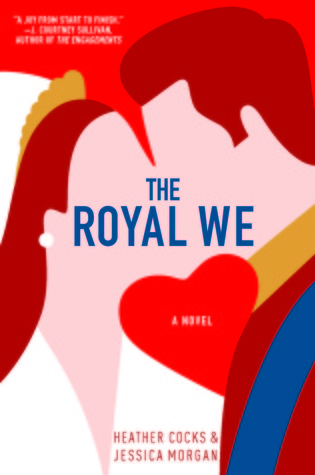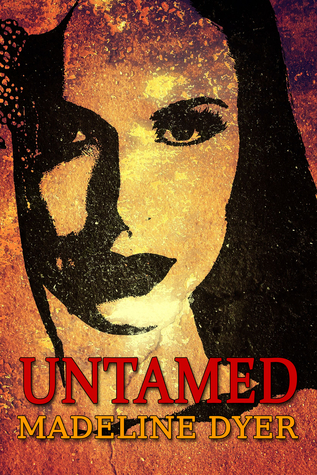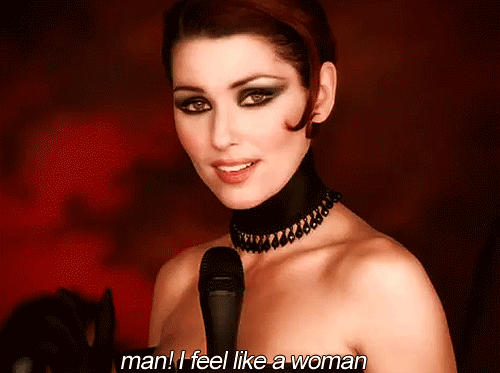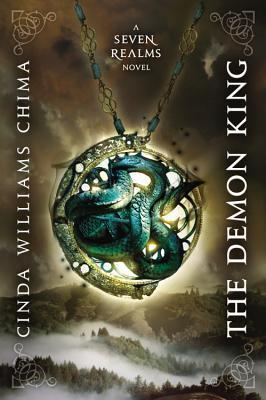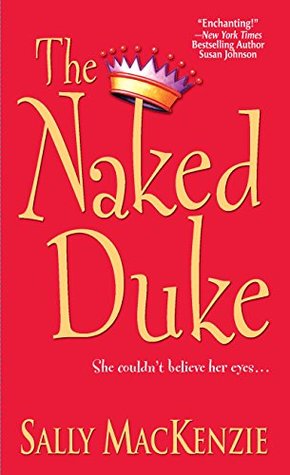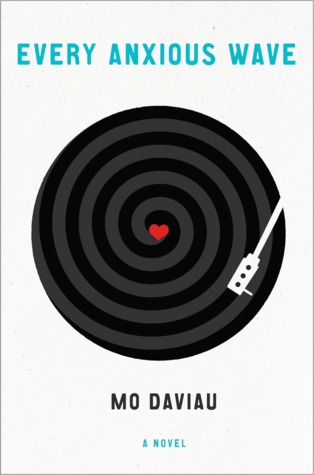It's been more than a month since my last reading challenge update, and while I've read a ton of books in that time, I actually haven't read too many challenge books. Oops. I'll have to pay more attention to that going forward. It can just be so
hard when there are so many other books clamoring for my attention. Still, I have made some progress, and a few adjustments to my upcoming challenge choices.
Completed!
-A book that you've already read at least once. I did
Harry Potter and the Chamber of Secrets for this one. Upon re-reading it, I thought it was a good story in and of itself, but I'm not really sure that it served the series as a whole.
-A book that is published in 2016. I did
The Mirror King, which came out on April 5th, for this one. It was good but not nearly as entrancing as its predecessor,
The Orphan Queen, was. A bit of a disappointment considering how hyped up I was for it!
-A murder mystery. I used
Grave Beginnings for this one
. The main character, Vincent Graves, is a soul who inhabits the bodies of people who were killed in supernatural circumstances, and in this book he's trying to solve the murder of the guy who he ends up inside. Some really interesting premises here, but Graves drove me crazy for half the book (the first half) and I think it needed some editorial work.
-The first book you see in a bookstore. I cheated a
tiny bit with this one and went with the first book I saw in the library instead. That ended up being
Every Anxious Wave by Mo Daviau. Another book with some interesting concepts, but overall it missed the mark for me.
-A book that's guaranteed to bring you joy.
A College of Magics is my favorite book and I enjoyed re-reading this time as much as I do
every time. I love Faris and Tyrian, I love Greenlaw, I love Aravis, I love it all. Unfortunately, the poor book has suffered some pretty dismal reader reviews as the result of a poorly-chosen cover review that compares it to
Harry Potter, when the two are really nothing alike.
A College of Magics needs to be approached for its own merits, not because Jane Yolen compared it to
Harry Potter, but when you
do read it for what it is, what it is turns out to be a real gem.
Still to Come
-A science-fiction novel. Once again, I'm looking for a new title for this category. I have a few books in my possession that would fit this, so we'll see which one I'll get to first... It's likely to be
The Three Body Problem or
The Windup Girl.
-A book based on a fairy tale. I adore fairy tales, so this category had a whole bunch of possibilities for me! I settled on Gregory Maguire's
Confessions of an Ugly Stepsister, which is quite clearly an adaptation of Cinderella from the stepsister's point of view. I read
Wicked in high school and found it good but
weird, so I'm interested in seeing how this one plays out.
-A National Book Award winner. I don't really know much about book awards, as I tend to ignore them in favor of reading whatever interests me at the time. So I had to pull up the
list of National Book Award winners to have something to go off for this one. Most of them didn't really intrigue me (who decides what makes a book award-worthy, anyway?) but I eventually picked
The Shipping News off the list as looking at least mildly interesting.
-A book you haven't read since high school. This is hard. I tend to re-read books that I like on a fairly regular basis; hardly a year goes by when I don't re-read most of Tamora Pierce's works in a one-week binge. That said, I
know that the last time I read Peter Dickinson's
The Ropemaker was in high school, because I then lent it to someone who never returned it. So I'll read that for this category.
-A book set in your home state. For this I'm thinking I'll try to read
American Rust by Philipp Meyer, which is set in a Pennsylvania steel town.
-A book translated to English. I'm thinking
Toilers of the Sea for this one.
Les Miserables, which is probably about on par with
The Hunchback of Notre Dame for Victor Hugo's most famous book, is one of my favorites, so this should be a good one while adding in another classic for this list. However, I also got
Becoming Marta for free through the Kindle First program, so I might end up reading that instead.
-A book recommended by someone you just met. I asked the NaNoWriMo Facebook group what they thought I should read this year; one reply was already on the list (
Grave Beginnings) but the other was not; therefore, I shall be reading
The Machinery by Gerrard Cowan for this category.
-A self-improvement book. I don't really know what a self-improvement book is, other than a self-help book, and I don't really think I need a lot of help from books, so this one was a bit challenging. So I went to Google and pulled up a list of best self improvement books!
An Astronaut's Guide to Life on Earth jumped out at me because one of my friends from college read it recently and rated it quite highly, so this one it is!
-A book written by a celebrity. Okay, so I saw
Elixir by Hilary Duff
ages ago, probably when it first came out, but I didn't read it because I was skeptical. I mean, celebrities writing? Who does that? And I'm always convinced it's really a ghostwriter doing the real work. But now it seems like it's a good time to try this one out. I was going to read Tina Fey's
Bossypants for this, but I'm already reading a comedian's book for another category, so I didn't want to double-dip.
-A political memoir. Now, politics really annoy me in general, so this category was not very exciting. However, after some deliberation, I've decided to read Malala Yousafzai's memoir,
I Am Malala. While Malala isn't a politician who goes about campaigning for office, she is definitely a political figure due to the causes she represents and the consequences she has faced because of them.
-A book at least 100 years older than you. I'm actually going to get around to
20,000 Leagues Under the Sea for this one, because I want to read one of the steampunk novels that started it all as research for my own writing.
-A book from Oprah's Book Club. After much perusal of the complete list (found
here) I've settled on Malika Oufkir's memoir
Stolen Lives, because the categories this year are sorely lacking in nonfiction
and this seems like one of the better titles on the list in general--at least among those that I haven't read yet.
-A book recommended by a family member.
-A graphic novel. I love Neil Gaiman but am not a huge fan of graphic novels, so I've avoided his Sandman series up until this point, despite buying my boyfriend the entire series for various occasions. Now seems like a pretty good time to give them a go and start in
Vol. 1: Preludes and Nocturnes.
-A book with a protagonist who has your occupation.
-A book that takes place during summer. Apparently
Atonement is set during the summer? The internet says it is. I've wanted to read
Atonement for a while so this seems like a good place to slot it in.
-A book and its prequel. I am
half done with this category after reading Hugh Howey's
Wool and realizing it has a prequel,
Shift. I have
Shift out from the library now so I'll be knocking this category out in the near future.
-A book of poetry.
-A classic from the 20th century. I'm going to do
Lolita for this one, because I feel like I need to squish a Russian novel in here somewhere. What really makes a classic, anyway? I don't know, but
this list that I found says
Lolita is one.
-An autobiography. I picked up
Papillon by Henri Charriere at a used bookstore in New Jersey (Broad Street Books in Branchville, if anyone out there is in the area; it was absolutely lovely and I look forward to going back the next time we're in the area) but put it down in favor of another title. Now I wish I'd bought it! Charriere wrote this book about his wrongful conviction for a crime and his subsequent escapes from prison. Most autobiographies bore me on principal, but this one actually sounds interesting.
-A book about a culture you're unfamiliar with. I'm leaning towards
Shutting Out the Sun for this one, which is a non-fiction book about Japan's "lost generation."
-A satirical book. I've partially changed my mind on this one; instead of
Thing Explainer, I want to read
What If? which uses science to answer absurd hypothetical questions and makes fun of how things work in general in the process.
-A book that takes place on an island. I'm going to do
And Then There Were None for this, because I got it on special from Amazon recently. It's a closed-circle mystery, and while I know the premise, I don't know the details.
-A book you've been meaning to read. I've had
Street Fair on my Kindle for a while now, but keep prioritizing library books over it because they have due dates and it doesn't. I'll have to make sure I get to it for this category!
-A book recommended by your local librarian or bookseller.
-A book you should have read in school. This I'm going to fill with
The Odyssey, which every other English class in my high school read, but my class as a whole did not because our teacher was too busy having raptures about the hero's journey in the Star Wars series to actually assign it to us.
-A book chosen for you by your spouse, partner, sibling, child, or BFF.
-A book published before you were born. Let's face it: most of history is before I was born. This means that I have a very wide scope of titles from which to choose. I'm going to go with the classics and choosing
Wuthering Heights for this one.
-A book that was banned at some point. Maybe now that I have a public library card I can
finally get my hands on
Perks of Being a Wallflower. I meant to use
Perks for the banned book category last year, but could never get it from the library, so hopefully this is my year!
-A book you previously abandoned. I'm planning on using
Jonathan Strange and Mr. Norrell for this one. I've had this book for years, and started it at one point, but I just couldn't get into it. I'm hoping that time will have improved it some for me, just like how I liked
Vellum much more when I returned to it years after first purchasing and attempting to read it.
-A book you own but have never read. I picked up
The Mapmakers at the Smithsonian nearly a year ago, but haven't read it yet. It...or the 400 other books on my Kindle...but I'll use
The Mapmakers for this one.
-A book that intimidates you. I admit it, I don't understand this category. Beyond books full of advanced theoretical physics, I don't think there are many books that are downright intimidating, so I'm not sure what to make of this category.
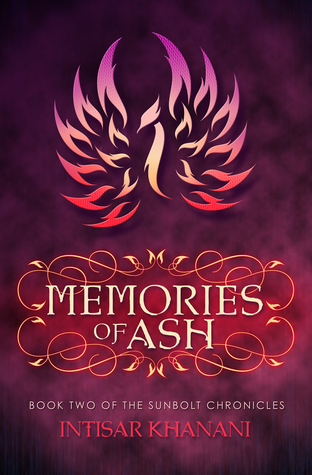 Let me start by saying this: Intisar Khanani is my favorite indie author. I read her first book, Thorn, several years ago in one breathtaking sweep. It was exquisite. Khanani has a way of creating a world and characters who are real and who hurt and struggle just as we do, and who can also thrill in their successes and cling to the hope of the future. Her books are not light-hearted or funny, but her words are poetry on the page, and Memories of Ash continued this tradition. It follows in the wake of Sunbolt, a novella about a girl whose magical powers have been kept secret in a world where magic is regulated. As a member of the Shadow League, Hitomi helped to work against Arch Mage Blackflame to counter his injustices. In the process, she is captured and has to work not only to save herself, but to save a breather named Val, who could end her life with just one inhalation.
Let me start by saying this: Intisar Khanani is my favorite indie author. I read her first book, Thorn, several years ago in one breathtaking sweep. It was exquisite. Khanani has a way of creating a world and characters who are real and who hurt and struggle just as we do, and who can also thrill in their successes and cling to the hope of the future. Her books are not light-hearted or funny, but her words are poetry on the page, and Memories of Ash continued this tradition. It follows in the wake of Sunbolt, a novella about a girl whose magical powers have been kept secret in a world where magic is regulated. As a member of the Shadow League, Hitomi helped to work against Arch Mage Blackflame to counter his injustices. In the process, she is captured and has to work not only to save herself, but to save a breather named Val, who could end her life with just one inhalation.
